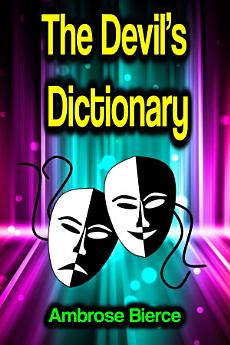The Devil's Dictionary
ធ្នូ 2021 · Phoemixx Classics Ebooks
សៀវភៅអេឡិចត្រូនិច
444
ទំព័រ
family_home
មានសិទ្ធិ
info
reportការវាយតម្លៃ និងមតិវាយតម្លៃមិនត្រូវបានផ្ទៀងផ្ទាត់ទេ ស្វែងយល់បន្ថែម
អំពីសៀវភៅអេឡិចត្រូនិកនេះ
The Devils Dictionary Ambrose Bierce - Ambrose Bierces Devils Dictionary is a classic that stands alongside the best work of satirists such as Twain, Mencken, and Thurber. This unabridged edition will be celebrated by humor fans and word lovers everywhere.If we could only put aside our civil pose and say what we really thought, the world would be a lot like the one alluded to in The Unabridged Devils Dictionary. There, a bore is "a person who talks when you wish him to listen," and happiness is "an agreeable sensation arising from contemplating the misery of another." This is the most comprehensive, authoritative edition ever of Ambrose Bierces satiric masterpiece. It renders obsolete all other versions that have appeared in the books ninety-year history.A virtual onslaught of acerbic, confrontational wordplay, The Unabridged Devils Dictionary offers some 1,600 wickedly clever definitions to the vocabulary of everyday life. Little is sacred and few are safe, for Bierce targets just about any pursuit, from matrimony to immortality, that allows our willful failings and excesses to shine forth.This new edition is based on David E. Schultz and S. T. Joshis exhaustive investigation into the books writing and publishing history. All of Bierces known satiric definitions are here, including previously uncollected, unpublished, and alternative entries. Definitions dropped from previous editions have been restored while nearly two hundred wrongly attributed to Bierce have been excised. For dedicated Bierce readers, an introduction and notes are also included.
អំពីអ្នកនិពន្ធ
Ambrose Gwinnett Bierce (1842-1914) was an American editorialist, journalist, short story writer, fabulist and satirist. Today, he is best known for his short story, An Occurrence at Owl Creek Bridge and his satirical lexicon, The Devil's Dictionary.The sardonic view of human nature that informed his work along with his vehemence as a critic, with his motto "nothing matters" earned him the nickname "Bitter Bierce."Despite his reputation as a searing critic, however, Bierce was known to encourage younger writers, including poet George Sterling and fiction writer W. C. Morrow.Bierce employed a distinctive style of writing, especially in his stories. This style often embraces an abrupt beginning, dark imagery, vague references to time, limited descriptions, the theme of war, and impossible events.Bierce disappeared in December 1913. He is believed to have traveled to Mexico to gain a firsthand perspective on that country's ongoing revolution.
វាយតម្លៃសៀវភៅអេឡិចត្រូនិកនេះ
ប្រាប់យើងអំពីការយល់ឃើញរបស់អ្នក។
អានព័ត៌មាន
ទូរសព្ទឆ្លាតវៃ និងថេប្លេត
ដំឡើងកម្មវិធី Google Play Books សម្រាប់ Android និង iPad/iPhone ។ វាធ្វើសមកាលកម្មដោយស្វ័យប្រវត្តិជាមួយគណនីរបស់អ្នក និងអនុញ្ញាតឱ្យអ្នកអានពេលមានអ៊ីនធឺណិត ឬគ្មានអ៊ីនធឺណិតនៅគ្រប់ទីកន្លែង។
កុំព្យូទ័រយួរដៃ និងកុំព្យូទ័រ
អ្នកអាចស្ដាប់សៀវភៅជាសំឡេងដែលបានទិញនៅក្នុង Google Play ដោយប្រើកម្មវិធីរុករកតាមអ៊ីនធឺណិតក្នុងកុំព្យូទ័ររបស់អ្នក។
eReaders និងឧបករណ៍ផ្សេងទៀត
ដើម្បីអាននៅលើឧបករណ៍ e-ink ដូចជាឧបករណ៍អានសៀវភៅអេឡិចត្រូនិក Kobo អ្នកនឹងត្រូវទាញយកឯកសារ ហើយផ្ទេរវាទៅឧបករណ៍របស់អ្នក។ សូមអនុវត្តតាមការណែនាំលម្អិតរបស់មជ្ឈមណ្ឌលជំនួយ ដើម្បីផ្ទេរឯកសារទៅឧបករណ៍អានសៀវភៅអេឡិចត្រូនិកដែលស្គាល់។








